Why Lean 4 replaced OCaml as my Primary Language
programming_languages code theorem_proving perspectives
As I was reading Hacker News today, I happened to stumble upon an article titled "Why I Chose OCaml as my Primary Language".
This was a particularly interesting read for me: over the past few years, I have been gradually transitioning1 my primary language away from OCaml to another, newer, and hotter, language: Lean!2, and while I could understand why the author had chosen OCaml, I'm not sure I personally would make that decision.
Given the article waxes poetic on the positive tenets of OCaml, I figured it might also be interesting to hear the other side of the story — Why you might not want OCaml to be your primary language — and from an experienced and prolific3 former OCaml dev (and chair of the OCaml workshop for this year~).
In the rest of this blog post, I'm going to walk through a few pain points I've had with OCaml over the past half a decade hacking on the language, and why, in the end, they've lead me to shift to other langauges, as an added bonus, for each one, I'll also give a taster about how these problems are solved in Lean, and allude to why I'm so excited about it.
My goal with this article is not to needlessly rag on OCaml: I've invested3 a considerable amount of effort into OCaml, and I certainly look very fondly upon my time with it. My hope in pointing out these issues is both to excite the wider community about newer programming languages such as Lean, and also give the OCaml community some spotlights on areas that could be improved!
Without further ado, let's dive straight in!
Issue no. 1: A philosophy of WYSIWYG and a lack of optimisations
An important aspect of OCaml that newcomers might want to bear in mind is that it is a language and community that prides themselves on being "unsurprising", and this reflects in a philosophy of WYSIWY.
The key guiding principle across OCaml code is that it is very easy to reason about, and a seasoned OCaml dev can quickly tell you exactly how a given OCaml function behaves at runtime, its performance and how it allocates memory, etc.
let List.iter f =
function
| [] -> () (* no alloc *)
| h :: t -> f h; List.iter f t (* no alloc *)
let sum ls =
let sum = { contents = 0 } in (* alloc (1 block) *)
let f x = sum := !sum + x in (* alloc (closure) *)
List.iter f ls; (* no alloc *)
a.contents (* no alloc *)
For example, just by looking at the above block of code, we can instantly tell that it allocates one block of memory and one closure on the heap.
This simplified model means that the runtime performance of code is very predictable, and it's easy to manually optimise code, but…
This means as a developer you alone are entirely responsible for making your code go fast, and sometimes this can mean obscuring the logic of your program in the quest for performance.
As a slightly more concrete example, consider the following function, to calculate the both the sum of a list and increment each value by its index:
let incr_sum ls =
let f = (fun (sum, i) vl -> (* alloc (closure) *)
let sum = sum + vl in
let vl = vl + i in
let acc = (sum, i + 1) in (* alloc (tuple) *)
(vl, acc) (* alloc (tuple) *)
)
let (ls, (sum, _len)) ==
List.fold_map ls (0,0) in (* alloc (list + tuple) *)
(ls, sum) (* alloc (tuple) *)
I've written it out in an expanded form to make the allocations clear, but if I were really code-golfing, I'd probably write it in my own code in the following simplified form:
let incr_sum ls =
let open Pair in
let update vl =
Fun.flip (map_same2 (+)) (vl, 1) &&& snd_map ((+) vl) in
List.fold_map (Fun.flip update) (0,0) ls
|> map_fst fst
|> swap
Who said only Haskell programs could be unreadable4. Anyway, that being said, from a performance perspective, this implementation is not ideal because it allocates a lot (doubly so for my simplified version) with intermediate tuples and closures.
If memory were to become a constraint, then, as the OCaml compiler itself is very conservative in its optimisations5, we would be forced to come back to this function and manually rewrite it in order to get the desired allocation patterns, for example:
let incr_sum ls =
let i = ref 0 in (* alloc (block) *)
let sum = ref 0 in (* alloc (block) *)
let f = (fun vl -> (* alloc (closure) *)
i := !i + 1;
sum := !sum + vl;
vl + (!i - 1) (* no allocs in hot-path *)
) in
let ls = List.map f ls in (* alloc (list) *)
(ls, !sum) (* alloc (tuple) *)
In this case, if you come from an imperative background, then maybe this version of the program looks "better" for you, but in larger functional programs, building up such functional pipelines leads to more idiomatic and shorter code and as such is quite ubiquitous if you are an experienced OCaml dev.
The main point I'm making here is that, from an individual developer's perspective, I'm forced to strike a compromise between concisely expressing my intent (i.e computing this fold over a list), and obtaining high performance. In a vacuum, these compromises might be okay, but they also come with a cost of an increased maintenance burden.
Comparison to Lean
Finally, let me talk about how this differs in Lean.
As a newer language, it is harder to give any strong claims w.r.t the direction of the community, currently as far as I am aware, the compiler itself doesn't perform any radical optimisations, but the language itself makes up for this with a) more memory reuse (thanks to it's clever reference-counting with memory reuse algorithm Perceus), and b) thanks to a tower of macro-based abstractions that allow an extensible form of optimisations while still compiling down to a purely functional langauge:
def incr_sum (ls: List Int) : List Int × Int := Id.run $ do
let mut sum := 0
let mut res := #[]
for (vl, i) in ls.zipIdx do
sum := sum + 1
res := res.push (vl + i)
return (res.toList, sum)
Admittedly the abstractions in the above code probably make it a bit slower than the comparable OCaml one, but the nice thing about Lean's metaprogramming support is that in theory, we could incrementally introduce our own optimisations into the pipeline in the future as needed, but we'll come on to macros in a bit.
Issue no. 2: A slow and conservative release cycle
Branching out from the conservative nature of the language itself, this same philosophy of being conservative and backwards-compatible extends in some sense to the compiler ecosystem of the language itself. OCaml is an amazingly stable langauge, and major kudos have to be given to the community for insisting on such high standards for the ecosystem:
You can almost bet that code from more than a decade ago will run on the latest OCaml compiler, with minimal changes, if at all.
While this is great for ensuring the utility of your code over time, a sad consequence of this is that the language evolves at a very slow pace, and this extends even to things such as the standard library.
Consider this thread of adding dynamic arrays – that is, an array datastructure with O(1) access and resizable allocation:
type 'a t (* dynamic array *)
val alloc: int -> 'a t (* alloc *)
val (.[]): 'a t -> int -> 'a (* O(1) get *)
val (.[]<-): 'a t -> int -> 'a -> unit (* O(1) set *)
val push: 'a t -> 'a -> unit (* realloc (if needed) *)
This was initially proposed back in 2019 (6 years ago !!), by a fresh-eyed newcomer to the community:
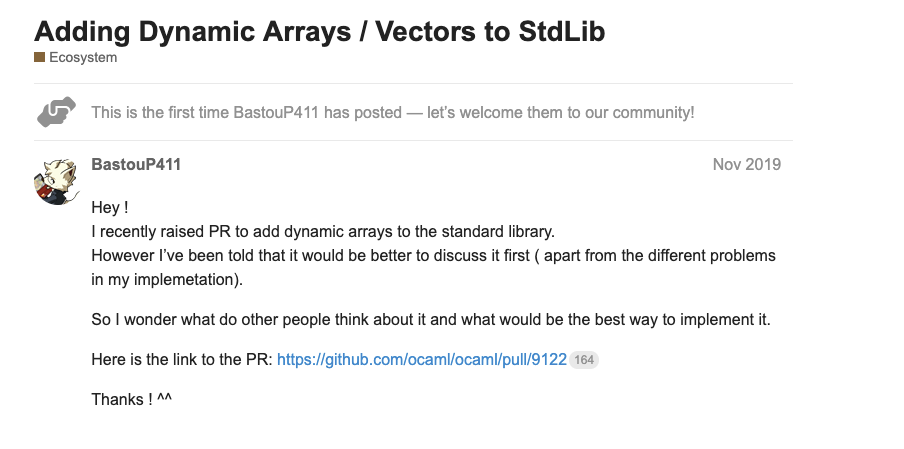
The PR very quickly succumbed to orthogonal discussions of naming and was eventually closed.
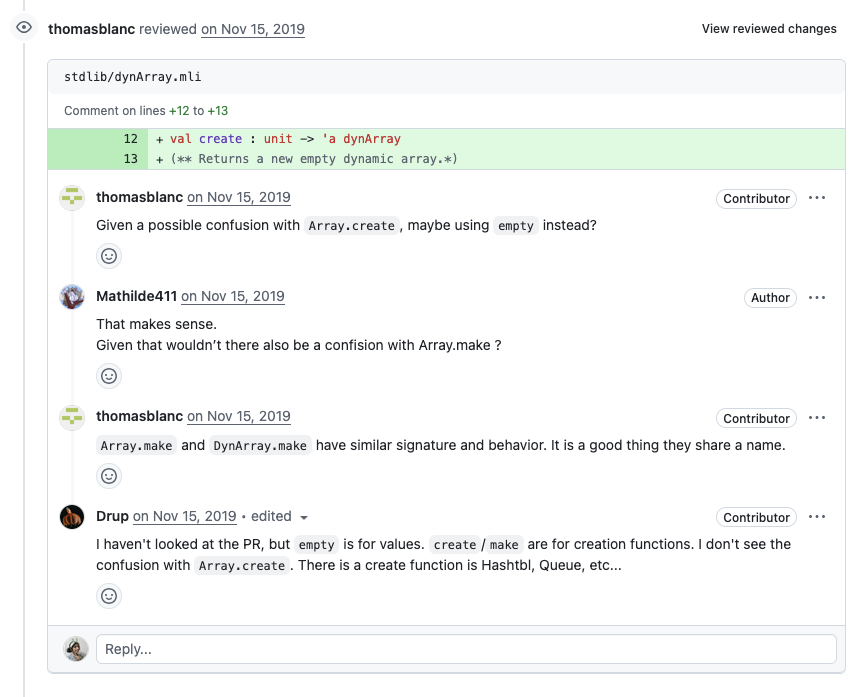
Three years later, another PR was created in a second attempt but also fared the same fate:
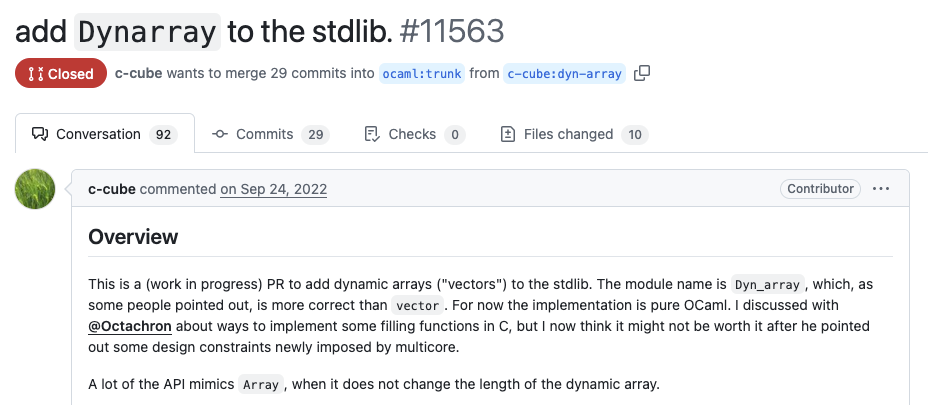
It was only last year, that this long saga was finally concluded, and dynamic arrays joined the stdlib:
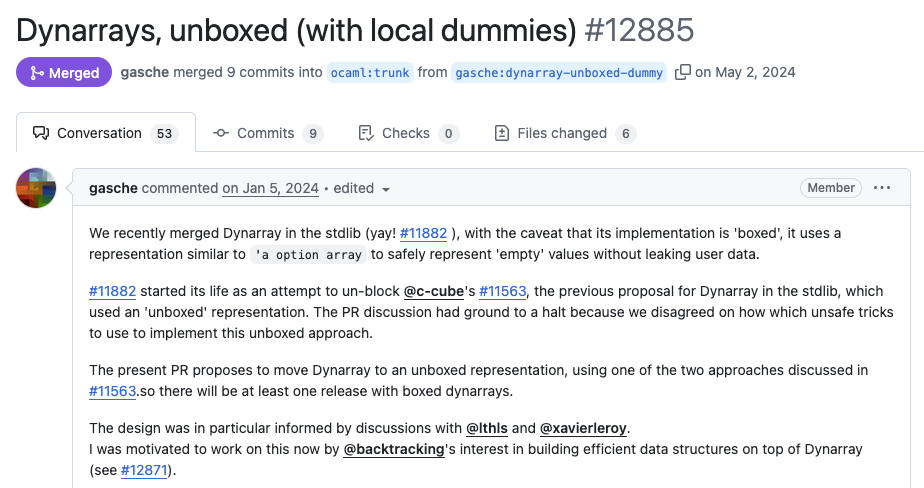
Now, there were legitimate reasons for the level of caution and discussions that the community took to introduce even such a simple datastructure to the language: given its focus on backwards compatibility, any introduction to the standard library would likely continue to have to be maintained for the forseeable future, so it was critically important to move carefully here.
Again, to stress the point, OCaml's strong commitment to backwards comparability, is genuinely and truly one of the most impressive features of the language, but you can also imagine that as a developer interested in extending and exploring new abstractions for their langauge of choice, this can be a bit of a dampener.
Features such as modular implicits, an OCaml-specific variant of type-classes have been being discussed for several years now, and are unlikely to be deployed anytime in the near future:
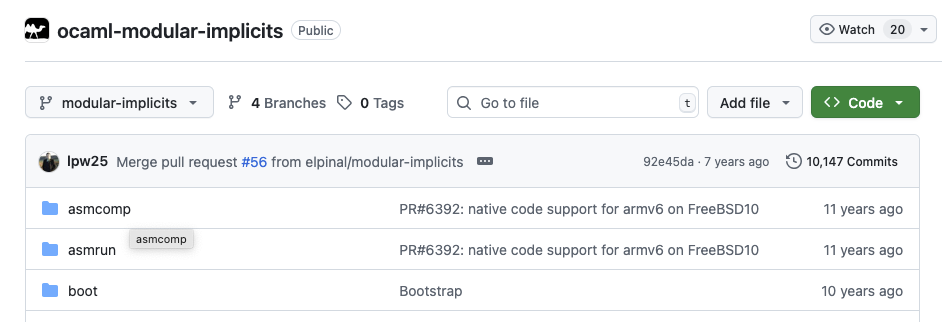
Comparison to Lean
Finally, to contrast to Lean: as the new and scrappy kid on the block, the Lean language developers a lot more open to moving fast and breaking stuff. This has the consequence of meaning that often updating to the latest version of Lean will break your code, and there's an entire cottage industry of developers dedicated to fixing core libraries when that happens but the cool thing is that as a developer and user of the language, you have a very real capacity to get your changes incorporated into the language.
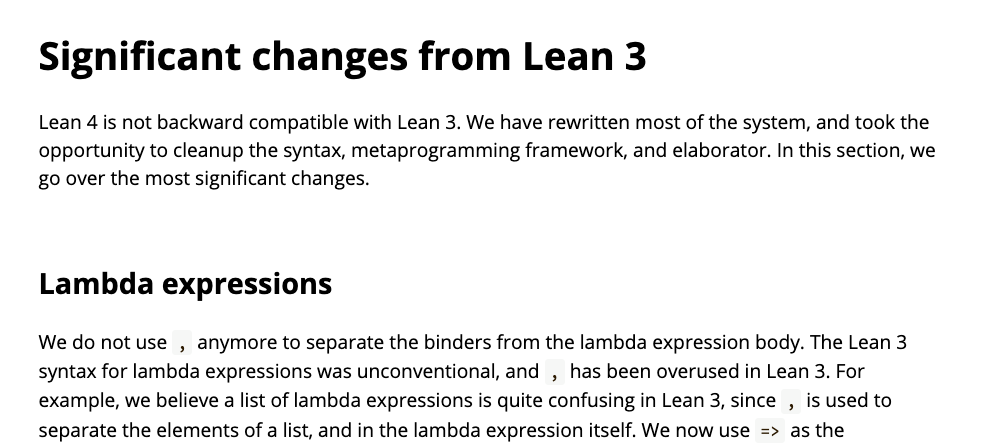
Issue no. 3: Minimal and restricted metaprogramming capabilities
A language and its ecosystem being conservative is not necessarily a problem in itself — in the case of libraries, developers can, and do, create custom replacements of the stdlib that change at faster paces as they prefer. For the case of language features however, a similar story is only possible if the language has good support for metaprogramming (think something like Lisp), and sadly, I can not say I am a huge fan of OCaml's metaprogramming story.
Macros in OCaml, in line with its broader philosophy, are conservative and generally unexciting.
The general form of macros in OCaml occurs through a
mechanism known as ppx s, which are syntax-to-syntax level
transformations. Nodes in the AST can be annotated with a tag
<node>%<tag_name>, which can then
serve as triggers for compiler plugins to rewrite the source
tree:
let%bind x = List.hd_opt ls in
...
(* expands to *)
Option.bind (List.hd_opt ls) @@ fun x ->
...
These macros are written as OCaml programs that are compiled into dynamic libraries linked into the compiler as plugins and run before the AST is processed further.
As an example, to implement an anaphoric lambda plugin
([%a it + 1] transforms to
fun it -> it + 1), one might write:
open Ppxlib
let name = "a"
let expand ~loc ~path:_ expr =
match expr with
| expr ->
[%expr fun it -> [%e expr]]
let ext =
Extension.declare name Extension.Context.expression
Ast_pattern.(single_expr_payload __)
expand
let () =
Driver.register_transformation name ~extensions:[ext]
The OCaml community has been doing some great work with Ppxlib, the library for constructing these plugins, but even with all the support it provides, constructing any non-trivial syntax transformation often requires manually wrestling with the compiler AST nodes and can quickly become quite unmanageable:
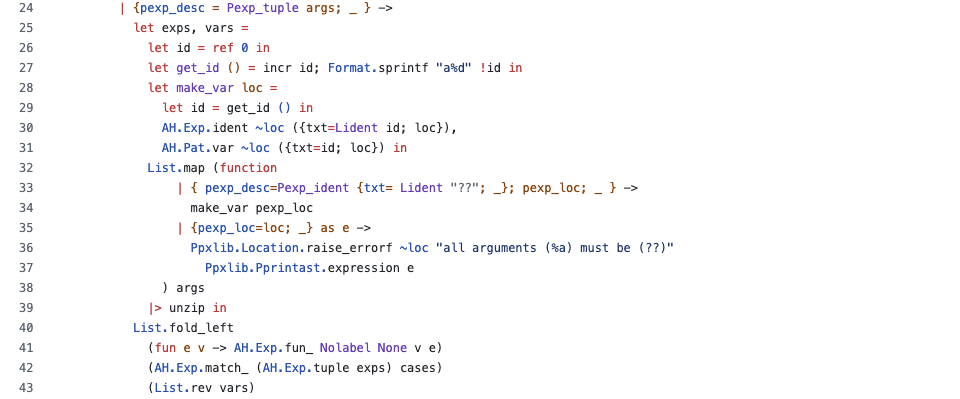
Beyond just the ease and beauty of writing these plugins, the eagle eyed reader may have noticed a more pressing problem — that is, there is no compiler support for syntax hygiene: the syntax-to-syntax transformation runs before any further processing of the AST, so the macro-author is entirely responsible for making sure they don't end up screwing up the names. This paired with the complexity of manipulating the syntax tree means that it is extremely difficult to make any non-trivial macro extension to the language.
Another limitation of this macro format is that it is purely syntax-to-syntax, and so it not possible to perform type-based transformations. There have been some attempts at type-aware metaprogramming, such as MetaOCaml, pioneered by the venerable Oleg Kiselyov, but this is mostly staged metaprogramming, lives in a isolated branch of the compiler, and operates by constructing and writing program strings to a temp directory, running the compiler on them and dynamically linking them into the current executable — i.e, no solely-compile-time metaprogramming is supported.
Comparison to Lean
If I'm being honest, the metaprogramming story is really the biggest reason that makes me super excited about Lean. It genuinely feels like writing in the language of the future, incorporating all the greatest hits from the last 50 years of PL research into a well thought out story where everything just works.
A full coverage of how awesome metaprogramming in Lean is would really deserve its own blog post in itself, but I'll try and cover some of the coolest aspects of it below.
The first component, is that Lean's core parser is itself extensible, and the language provides a mechanism for developers to introduce new syntax categories to the language on a per-library basis:
-- declare a new syntax category
declare_syntax_cat lang
syntax ident : lang
syntax "λ" ident " . " lang : lang
syntax "(" lang ")" : lang
syntax lang withPosition(ppSpace lang) : lang
syntax "lambda! " lang : term
#check lambda! λ x . x
The way this fits into the wider ecosystem is similar to state of the art PL languages such as Rhombus, where the parser uses the user-provided declarations to provide additional structure to the textual source code, constructing a generic parse tree that the compiler then uses macros to provide a semantics to.6
Macros in Lean then operate over this generic parse tree and transform it into terms in the language that the compiler can understand:
partial def expandLambda : Lean.TSyntax `lang -> Lean.MacroM (Lean.TSyntax `term)
| `(lang| $i:ident) =>
let str := Lean.Syntax.mkStrLit i.getId.toString
`(term| Term.var $str)
...
A cool aspect of the way the Lean developers have designed
the libraries here is in exploiting the dependent-typed
features of the language to provide some static checks for
manipulating this tree – for example Lean.TSyntax `lang corresponds to a generic parse tree
that is constructed from a parser matching the lang syntax
category described above, and the anti-quotation and pattern
matching will use this information to statically check your patterns.
The macro I presented above operates at the syntax level (in macro-expansion phase), and so it purely transforms syntax to syntax without type information, but for more complicated type-directed transformations, Lean also allows elaboration-phase macros, which operate as terms are being type-checked, and thus allow access to type information.
-- from a Lean library for bindings to Godot
syntax (name := lean_godot_out) "@" "out" term : term
-- elaboration time macro => access to type information
@[term_elab lean_godot_out]
def elabLeanGodotOut : Term.TermElab := fun stx oty => match stx with
| `(term| @out $stx:term) => do
-- elab a term to the compilers internal representation
let expr ← Term.elabTerm stx oty
-- add an annotation to the compiled information for this term
return (addOutMetadata expr)
These facilities also build upon well established practices and results from prior metaprogramming research, such as Racket's syntax hygiene for enabling scalable and composable macros. Metaprogramming in Lean genuinely feels even better than doing so in Lisp. In fact, the fact that Lean is a pure functional langauge actually allows for features that are not possible in Lisp – for example, Racket developers generally recommend not recursively calling the macro-expander within a user macro, as this may cause side-effects to be run multiple times; as Lean is pure, users are free to run all the facilities of the Lean as many times as they need recursively, which allows you to do this such as, for example, attempting to type-check a term with a specific type, and performing different macro-transformations based on whether that succeeds or not.
If you are a Lisper, please, if nothing else, I urge you to check out Lean — after several decades, PL research has finally progressed to the point that we have a language that can fulfil the promises that Lisp envisioned.
Issue no. 4: An opinionated build system
This is a relatively minor point, but it's caused me some pain in the past, so I figured it's worth mentioning.
OCaml's build systems have evolved a lot over the years, and it has taken some time to converge upon a robust and efficient solution that works for most people. Thanks to the folks at Jane Street, who developed the Dune build system, OCaml now has a really nice and consistent story w.r.t building.
Simply write a dune file, which uses a pretty uncontroversial and simple s-expression-based syntax to describe your project and its dependencies, and voila, your project can be built with minimal fuss~
(library
(name lib)
(deps ...))
…that is assuming you're not straying too far from the "happy path".
That is, dune works well for most OCaml projects, but, as a self-titled "opinionated build manager", deliberately provides a restricted set of possible build actions — if you want to do things like generating text as part of your build and so on and so forth, you'll very quickly find yourself running into walls.
Dune supports a number of extensions beyond pure OCaml, such as supporting Ctype-based projects with FFI, and C builds, and even some Rocq build support, but these extensions are all driven mostly by what Jane Street wants or uses, and straying too far from the beaten path will lead to pain.
Comparison to Lean
A comparison to Lean isn't entirely fair here, as Lean, given its age is still figuring out the exact build process it wants to use, and not to mention, it doesn't quite have as robust a story for package management as OCaml does (I run into a lot of problems where using wrong versions can cause unrelated packages to fail to build).
That being said, I still wanted to take a second to point out a little thing that I thought was really cool:
Lean's Lake build files are written in Lean itself!
So, this might not be the case forever, it seems like there's a push to move towards TOML files (at least from reading the documentation recently), but at the time of writing, one format for the build description of Lean projects is simply as a Lean file that imports a build DSL:
import Lake
open Lean Lake DSL
require mathlib from git
"https://github.com/leanprover-community/mathlib4.git"
require betterfind from "./BetterFind"
package probability where
lean_lib BallsInBins where
Naturally, because Lakefiles are simply Lean code itself, and thanks to the extensibility of the metaprogramming facilities in Lean, this offers an amazing deal of flexibility in constructing your own extensions to the build process, and I've even managed to single-handedly over a weekend recreate several features I've needed from Dune such as a restricted equivalent of OCaml's ctypes and ctypes-build support, or even use it to generate LaTeX pdfs.
Conclusion
With that I've reached the end of the biggest pain-points I've had with OCaml over my time with it. Hopefully, it's given you an alternative perspective on the language and some of its features that you might not like.
I think an arguable caveat to all of these criticisms is that in some sense, they're only a problem if you're a solo-developer — the WYSIWY nature of the language, the restrictive metaprogramming support, the constrained build system and runtime representations are all features that, if you're a company looking for stable and consistent code, are arguably positives. This would certainly explain the popularity of OCaml in companies like Jane Street and Ahrefs, where unexciting and boring code is a distinct positive (no-one wants to be the one to explain why you just lost a bajillion dollars because your macro had a typo).
That being said, if you're a developer who wants to exploit the multiplicative factor of a truly flexible and extensible programming language with state of the art features from the cutting-edge of PL research, then maybe give Lean a whirl!
Plus, as an extra benefit, you might even end up contributing to state of the art mathematics research~
Footnotes
It happened to coincide with physically transitioning my sex too haha~
It's an especially interesting language because it's both a dependently typed theorem prover and a practical and usable functional language, more than capable of rivaling OCaml in day to day use.
It's not critical to the main points in this article, but if you're interested, my credentials to the OCaml community include:
- Author of the first type-safe embedded SQL library for OCaml, Petrol
- Developing the first federating Activitypub server in OCaml, OCamlot
- Building the first structural-editing plugin for OCaml, Gopcaml-mode, years before tree-sitter was even conceived, with several features that still surpass the state of the art in other comparable tools.
- Authoring state-of-the-art award winning research prototypes with 40,000 LOCs mostly myself in OCaml, Sisysphus.
- Minor brag, correcting a mistake in one of the most widely referenced texts on OCaml's type-checker.
- I'm also a trans-girl in CS, so you can somewhat assume I'm pretty cracked.
Believe it or not, this was me being a bit restrained. If we were really code-golfing, I might have gone with:
let incr_sum ls =
let open Fun in
let update =
curry
Pair.((fold (flip (map_same2 (+)) % (flip make 1))
&&& fold (snd_map % (+))) % swap) in
List.fold_map update (0,0) ls
|> Pair.swap % Pair.map_fst fst
Beautiful.
The Flambda mode improves things a bit, but still is extremely conservative in what gets optimised.
The parser is so easy to extend that I have some projects where I've literally embedded the grammar of another language into Lean itself, such as with my Lean bindings to the Clingo answer set programming language.
declare_syntax_cat clingo_symbol
syntax "#inf" : clingo_symbol
syntax "#sup" : clingo_symbol
syntax num : clingo_symbol
syntax str : clingo_symbol
syntax ident : clingo_symbol
declare_syntax_cat clingo_term
-- symbol
syntax (name := clingo_term_symbolic) clingo_symbol : clingo_term
-- unary operators
syntax "-" clingo_term : clingo_term
syntax "~" clingo_term : clingo_term
syntax "|" clingo_term "|" : clingo_term
-- binary operators
syntax:10 clingo_term:10 " ^ " clingo_term:11 : clingo_term
syntax:20 clingo_term:20 " ? " clingo_term:21 : clingo_term
syntax:30 clingo_term:30 " & " clingo_term:31 : clingo_term
syntax:40 clingo_term:40 " + " clingo_term:41 : clingo_term
syntax:50 clingo_term:50 " - " clingo_term:51 : clingo_term
syntax:60 clingo_term:60 " * " clingo_term:61 : clingo_term
syntax:70 clingo_term:70 " / " clingo_term:71 : clingo_term
syntax:80 clingo_term:80 " \\\\ " clingo_term:81 : clingo_term
syntax:90 clingo_term:90 " ** " clingo_term:91 : clingo_term